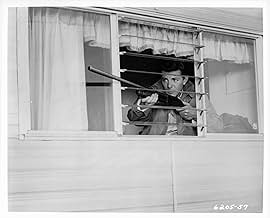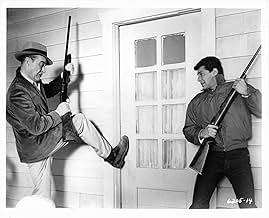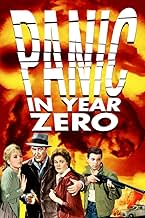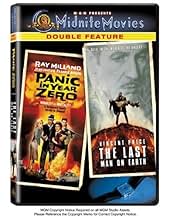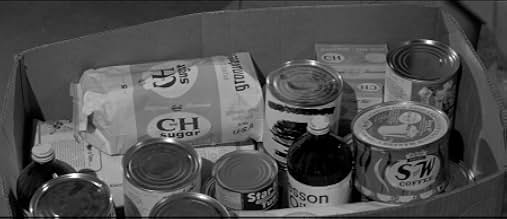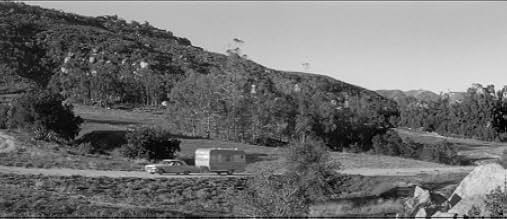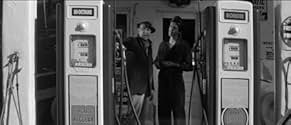IMDb RATING
6.6/10
5.4K
YOUR RATING
A family leaves Los Angeles for a camping trip just before hydrogen bombs destroy the city. In the midst of the chaos, the father must fight to keep his family alive along the highway.A family leaves Los Angeles for a camping trip just before hydrogen bombs destroy the city. In the midst of the chaos, the father must fight to keep his family alive along the highway.A family leaves Los Angeles for a camping trip just before hydrogen bombs destroy the city. In the midst of the chaos, the father must fight to keep his family alive along the highway.
Neil Burstyn
- Andy
- (as Neil Nephew)
Chet Brandenburg
- Roadside Diner Customer
- (uncredited)
Ralph Clanton
- Radio Announcer
- (voice)
- (uncredited)
Kelton Crawford
- Looter
- (uncredited)
Featured reviews
A family struggles to survive the anarchy in a world devastated by nuclear war. This is a believable story by the standards of the time it was produced; the possibility of a nuclear winter had not yet been considered. There are no bands of mutants roaming around eating the survivors, just ordinary criminal types. Yes, I'm afraid that circumstances like that do bring such people out of the woodworks. Ray Milland's character makes intelligent, and sometimes hard, decisions to ensure his family's survival.
This is a genuinely enjoyable example of a "post-nuclear holocaust survival
film." It may seem a bit campy by modern standards, but is actually well thought- out and acted. The early 60's were an era in which it seemed possible to
contemplate a nuclear war that broke down civilization's normal function
withOUT reducing the entire countryside to rubble. A man takes his family out into the country to escape the chaos, still clinging to the hope that normalcy and order will soon return. His wife is horrified at his newfound ruthlessness, and the kids seem willing to go with the new rules of the jungle.
Ray Milland was at one time an acclaimed actor, but his academy award for
"Lost Weekend" seems to have cursed his career. Now regarded as a "serious"
actor, suited only for "down" roles, he wasn't given much chance to work in the more "up" big-studio roles of the fifties. By the time he wound up at AIP, he was little more than a "has-been" to the public. But he retained real talent, as his directing and starring in this and other Sci-fi pictures of the period shows. When given a free hand, as in "Panic In Year Zero!" he took on challenges others
would have shied away from and showed that he still had a lot to offer. Sadly, big time directors continued to ignore him and the end of his life was defined by roles in "Frogs" and "The Thing With Two Heads" - films far worse than anything with Corman's name on them.
"Panic in Year Zero!" displays the basic conflict of compromise: Ray's character must compromise his beliefs and code of behavior in order to preserve what he cares for. His constant conflict with his wife displays the conflict between
differing ideas of what needs to be preserved - to her, saving the family by acts of savagery is unacceptable, and the only way to preserve civilization is to apply its rules in every situation. The ending seems to redeem Ray, but the fact is that the questions raised are answered by each viewer in the course of the film in his or her own way. Events in the film are not one-sided, and Ray's relation to the hardware store owner calls into question his position and correctness: perhaps by allying himself earlier with other decent people trying to survive, Ray could have saved his family from some of what it endures.
As we now re-acclimate ourselves to an era in which the possibility of "limited" nuclear attack (from national or independent terrorist groups) seems more likely than Mutual Assured Destruction, it is possible that films such as "Panic in Year Zero!" offer us important ethical problems. Problems we hope never to have to solve in real life, but which the screen offers a means to wrestle with in a safe environment.
film." It may seem a bit campy by modern standards, but is actually well thought- out and acted. The early 60's were an era in which it seemed possible to
contemplate a nuclear war that broke down civilization's normal function
withOUT reducing the entire countryside to rubble. A man takes his family out into the country to escape the chaos, still clinging to the hope that normalcy and order will soon return. His wife is horrified at his newfound ruthlessness, and the kids seem willing to go with the new rules of the jungle.
Ray Milland was at one time an acclaimed actor, but his academy award for
"Lost Weekend" seems to have cursed his career. Now regarded as a "serious"
actor, suited only for "down" roles, he wasn't given much chance to work in the more "up" big-studio roles of the fifties. By the time he wound up at AIP, he was little more than a "has-been" to the public. But he retained real talent, as his directing and starring in this and other Sci-fi pictures of the period shows. When given a free hand, as in "Panic In Year Zero!" he took on challenges others
would have shied away from and showed that he still had a lot to offer. Sadly, big time directors continued to ignore him and the end of his life was defined by roles in "Frogs" and "The Thing With Two Heads" - films far worse than anything with Corman's name on them.
"Panic in Year Zero!" displays the basic conflict of compromise: Ray's character must compromise his beliefs and code of behavior in order to preserve what he cares for. His constant conflict with his wife displays the conflict between
differing ideas of what needs to be preserved - to her, saving the family by acts of savagery is unacceptable, and the only way to preserve civilization is to apply its rules in every situation. The ending seems to redeem Ray, but the fact is that the questions raised are answered by each viewer in the course of the film in his or her own way. Events in the film are not one-sided, and Ray's relation to the hardware store owner calls into question his position and correctness: perhaps by allying himself earlier with other decent people trying to survive, Ray could have saved his family from some of what it endures.
As we now re-acclimate ourselves to an era in which the possibility of "limited" nuclear attack (from national or independent terrorist groups) seems more likely than Mutual Assured Destruction, it is possible that films such as "Panic in Year Zero!" offer us important ethical problems. Problems we hope never to have to solve in real life, but which the screen offers a means to wrestle with in a safe environment.
Shot in nice moody black-and-white CinemaScope, starring Ray Milland, Jean Hagen (a far cry from Lina Lamont here!), and Frankie Avalon getting the chance to do a serious role. Interestingly it was also directed by Ray Milland, and is a fairly accomplished little cinematic parable, again dealing with the threat, and here the after-effects, of atomic warfare.
Milland and his family set off on a weekend camping/fishing trip and a flash in the distance they think at first is lightning turns out to be an atomic mushroom cloud over Los Angeles. The rest of the film they attempt to survive and maintain some resemblance of civilized behavior while rationalizing their lapses into violence against the panic-stricken populace, looters, and opportunists who suddenly appear. It might easily have been handled as the exploitation film promised by the trailer (it's an American International production, after all), but is actually a very thoughtful and well-structured meditation on how people might react in the event of the massive nuclear attack everyone was fearing at the time.
Milland and his family set off on a weekend camping/fishing trip and a flash in the distance they think at first is lightning turns out to be an atomic mushroom cloud over Los Angeles. The rest of the film they attempt to survive and maintain some resemblance of civilized behavior while rationalizing their lapses into violence against the panic-stricken populace, looters, and opportunists who suddenly appear. It might easily have been handled as the exploitation film promised by the trailer (it's an American International production, after all), but is actually a very thoughtful and well-structured meditation on how people might react in the event of the massive nuclear attack everyone was fearing at the time.
American International pics are pretty consistent lesser-grade pleasures. If you have a taste for them, there is a vast library of reasonably entertaining AIP movies out there. And occasionally they even outdo themselves. Panic in Year Zero is one of those better than average movies. Working with a typically low AIP budget, Milland, as director, concentrated on getting really fine performances out of the actors and telling his post-atomic war story by focusing on one family trying to find safety in isolation. Overall, it worked well and makes this a film worth seeing.
Los Angeles family vacation is interrupted by nuclear war. Now they must escape into the mountains to avoid the radiation, the panic, and the rapists.
Despite the insipid nuclear holocaust effects (looks more like a thunderstorm), this is a surprisingly effective movie. Milland elicits effective performances from each and every member of his cast (Frankie Avalon has never been better). The menace, humiliation and sheer terror of rape has never been more poignantly depicted on the screen, and all without nudity. A minor classic.
Despite the insipid nuclear holocaust effects (looks more like a thunderstorm), this is a surprisingly effective movie. Milland elicits effective performances from each and every member of his cast (Frankie Avalon has never been better). The menace, humiliation and sheer terror of rape has never been more poignantly depicted on the screen, and all without nudity. A minor classic.
Did you know
- TriviaWhen the family is in the car at the beginning of the film and suspect something is happening, they cannot pick up any "CONELRAD" stations on the car's radio. CONELRAD (COntrol of ELectromagnetic RAdiation), established in 1951, was the first nationwide system for emergency broadcasts in the United States. All radios made between 1953 and 1963 were required to have marks on the AM dial at 640 and 1240 MHz where citizens were expected to tune to obtain civil defense information. CONELRAD was succeeded by the Emergency Broadcast System in 1963 (which did not use dedicated frequencies) and it, in turn, was replaced by the Emergency Alert System in 1997.
- GoofsIn the scene where the bridge is pulled down, to the left you can see bushes and the bridge pilings being pulled quickly in the opposite direction.
- Quotes
Dr. Powell Strong: Now, you stay on the back roads. And you keep your gun handy. Our country is still full of thieving, murdering... "patriots."
- Crazy creditsOther than the title, all credits are at the end of the movie.
- ConnectionsFeatured in Aweful Movies with Deadly Earnest: Panic in the Year Zero (1969)
- How long is Panic in Year Zero!?Powered by Alexa
Details
Box office
- Budget
- $225,000 (estimated)
- Runtime
- 1h 33m(93 min)
- Color
- Sound mix
- Aspect ratio
- 2.35 : 1
Contribute to this page
Suggest an edit or add missing content


